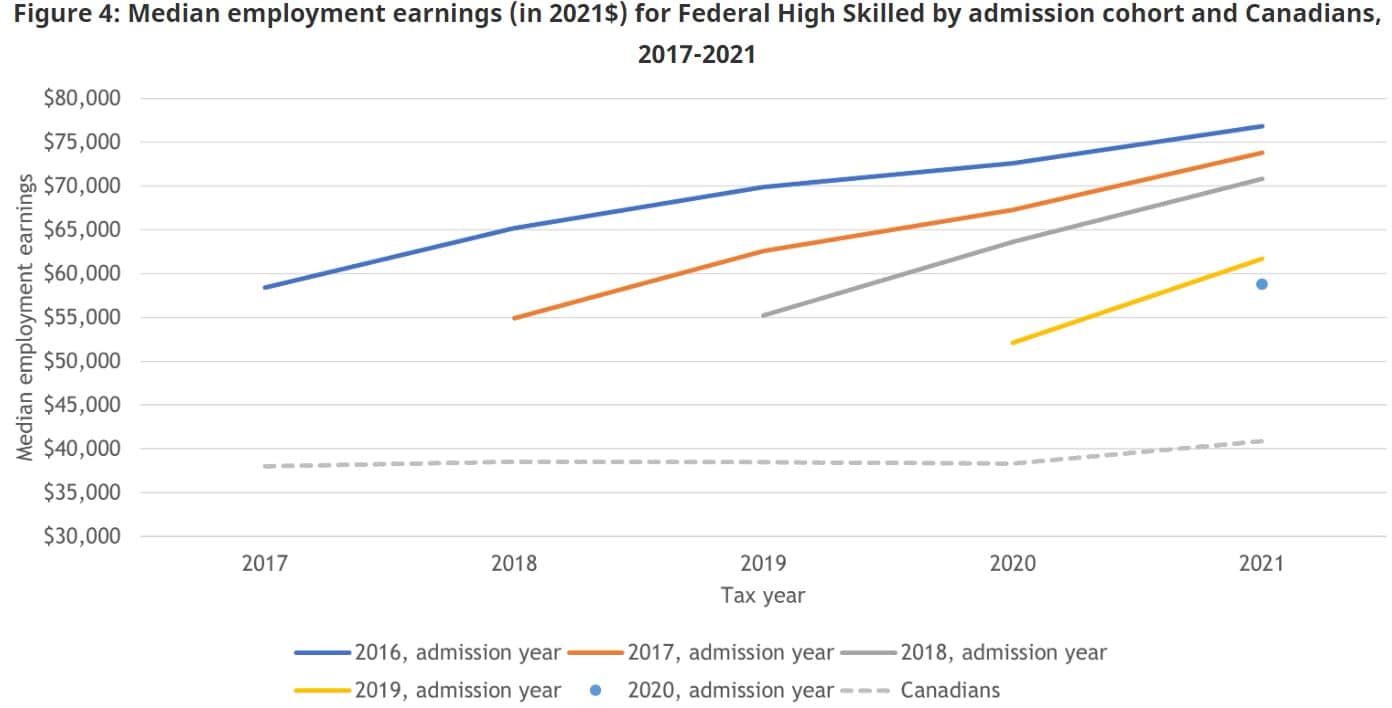Express Entry candidates continue to see positive economic outcomes
Newcomers who immigrate to Canada through an Express Entry-managed program often see a rapid increase in their median employment income during their first five years in Canada.
This is according to the 2023 Year-End Express Entry report. Immigration, Refugees and Citizenship Canada (IRCC) included data that shows the median income of newcomers through an Express Entry managed program is higher than that of Canadian-borns.
The data analyzes the median employment incomes of Express Entry candidates admitted between 2016 and 2021.
Get a Free Express Entry Assessment
Incomes consistently climbing
Since its introduction in 2015, Express Entry candidates have consistently seen positive long-term economic outcomes.
For example, the 2023 report found that those who were admitted in 2016 had median employment earnings of $58,400 in 2017, going up to $76,800 in 2021 (five years after landing). It also notes that newcomers admitted in 2018 earned a median of $55,200 in their first year, which rose to $70,800 three years after admission. This shows that wages for newcomers grew rapidly.

The median employment income for Canadians stayed relatively similar through all five years and was notably lower, starting at $38,006 in 2017 and rising to just $40,870 in 2021.
Often, newcomers who arrive through a federal high-skilled worker program, such as those managed by Express Entry, are well-suited to meet the needs of Canada’s labour market. They are invited to apply for permanent resident status based on their Comprehensive Ranking System (CRS) score, which evaluates candidates in-demand human capital attributes such as language. ability, work experience, occupation, age, and education. IRCC views those with the highest CRS scores as the most likely to successfully integrate into the Canadian economy.
In 2023, IRCC took this concept a step further by introducing category-based selection rounds of invitations. In these draws, Express Entry candidates are invited based on a specific attribute, most often their work experience, rather than an overall high CRS score. Data on the economic outcomes of these newcomers is not yet available.
By comparison, economic immigrants admitted to Canada through a non-Express Entry-aligned stream of a Provincial Nominee Program (PNP) tend to have lower median wages. The Report says that the median employment earnings for PNP admission cohorts ranged between the mid $40,000 range to the low $50,000s at one year since admission between the admission cohorts.
Additional scoring factors have little impact on income
The report notes that median incomes can be influenced by additional factors included in an Express Entry application. However, based on data from the report, the results show that additional scoring factors do not necessarily result in higher median incomes two to three years after admission unless candidates had the highest possible scores for these attributes.
For example, it found that applicants who were admitted to Canada in 2019 and had a three year or more post-secondary credential from a Canadian institution had slightly higher median employment earnings compared to those without a Canadian post-secondary credential.
In contrast, those admitted in 2019 with a 1-2 year post-secondary Canadian credential had a median income that was lower than those with no post-secondary education in Canada ($51,000 vs $61,100).
The same was true of those with siblings in Canada. The median wage two years after landing for those who arrived in 2019 was $53,100 for those with a Canadian or permanent resident sibling vs $61,200 for those who did not.
Arranged employment was the only additional scoring factor that showed higher median incomes. However, the level of income was also found to depend on the type of employment. Those with a pre-arranged job offer in a senior management role who arrived in Canada between 2017 and 2019 all had median incomes exceeding $200,000 two years after landing.
Those with pre-arranged employment in other occupations were also found to have higher median incomes than those who did not. For example, those who arrived in 2018 with an “other” job offer had median incomes of $84,500 while those without an arranged employment reported a median income of $60,700.
- Do you need Canadian immigration assistance? Contact the Contact Cohen Immigration Law firm by completing our form
- Send us your feedback or your non-legal assistance questions by emailing us at media@canadavisa.com






